
It is both interesting and coincidental that today of all days An Taoiseach and Minister for Defence should state that "Ireland is well on its way to becoming the tech capital of Europe and, despite Brexit, will continue to offer a stable Corporation Tax regime for tech companies". He said this last night at the opening of the Data Summit 2018 [1]. It is coincidental because today the veterans and families of Defence Forces personnel had to parade in Dublin for Respect and Loyalty from the Government.
I recently participated in the Cyber Defence East Africa (CDEA) 2018 exercise by invitation of the National Information Technology Authority - Uganda (NITA-U). In fact, that exercise which incorporated the Uganda Police Force, Data Protection Authority, Uganda Permanent Defence Forces, Bank of Uganda, Uganda IT Authority (NITA-U), the commercial banks and the Internet Service Providers will serve to put Uganda higher on the National Cyber Security Index (NCSI) [2] than Ireland. Ireland languishes in 65th place. Now in comparison, as an Taoiseach attested to last night, Ireland has a highly developed ICT industry, for example:
"There's no better place in the world today for ICT start-ups." Enterprise Ireland [3]
"Ireland has become the global technology hub of choice when it comes to attracting the strategic business activities of ICT companies. This has earned Ireland the reputation for being the heart of ICT in Europe. The industry employs over 37,000 people and generates € 35 billion in exports annually." IDA Ireland [4]
Currently there are 13 major international data centre locations in Ireland [5] with investment in these data centres to near € 9bn by 2021 [6]. This doesn't even include local originated data centres like the Cork Internet eXchange (CIX) and the National Software Centre (NSC) both in Cork. If one compares with the East Africa region, Uganda has no data centres, there is one in Mombassa, Kenya that is small and comparable to the size of CIX, there is a large computer room in Kigali, Rwanda but both are dwarfedby the size of the gigantic centres in Ireland like Equinx, Interxion and Citadel centres, and that doesn't even consider the large private centres like Amazon Web Services (AWS) or Microsoft.

As well as Data Centres we have a significant landfall of submarine fibre which are potential targets that would impact not only the Internet in Ireland but the Internet across Europe [7].

Now look at our Defence Forces prepardness on the National Cyber Security Index (NCSI) index [2], we have practically ignored these serious risks to an industry that directly employs over 105,000 people in Ireland and computer services are responsible for 22% of our national exports (2016, [8]).

If we compare Ireland's ranking in Cyber Defence preparedness to that of Estonia, a comparably sized country in Europe, Ireland languishes in 65th place with 32% versus Estonia in 3rd with 82%, and to show that Estonia is not an outlier, their neighbour Latvia is in 12th on 73%. No, unfortunately, Ireland is the outlier sharing the table with Oman and Tunisia. Many third world developing countries are much further up the table.
I would consider the Defence Forces having a number of roles in Ireland's cyber defence.
The CIS Corps needs a dedicated Cyber command unit that is specialised in planning and conducting cyber operations. The unit should conduct regular cyber operations exercises and embed such an element within overall large-scale military exercises so other units within the DF are 'aware' and have at least a rudimentary understanding of the digital threat and a set of SOPs to consider when meeting such a threat.
A final point is to highlight the fact that Ireland is the only Western European country that is not a member or does not participate in the Forum of Incident Response and Security Teams (FIRST). [9] This forum fosters cooperation and coordination in incident prevention, to stimulate rapid reaction to incidents, and to promote information sharing among members.
References:
[1] Varadkar, Leo (2018): Ireland 'on its way to becoming Europe's tech capital' [online]. Available at: https://www.rte.ie/news/2018/0919/994657-varadkar_tech/. Raidió Teilifís Éireann. 19 Sep 2018.
[2] https://ncsi.ega.ee/country/ie/
[4] https://www.idaireland.com/doing-business-here/industry-sectors/ict
[5] https://www.datacenters.com/locations?search-query=ireland
[6] Ciara O'Brien (2018): Data centre investment in Ireland to near €9bn by 2021 [online]. Available at: https://www.irishtimes.com/business/technology/data-centre-investment-in-ireland-to-near-9bn-by-2021-1.3456781. The Irish Times, 10 April 2018.
[7] https://www.submarinecablemap.com
[8] Labour Market Review, Information & Communication Technology [online]. Available at: https://www.collinsmcnicholas.ie/wp-content/uploads/2016/07/The-ICT-Industry-in-Ireland-2016.pdf. CollinsMcNicholas, July 2016.